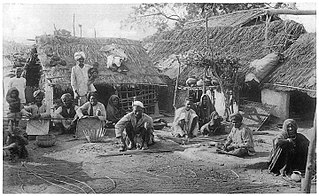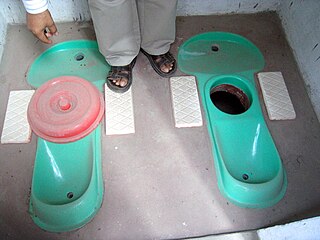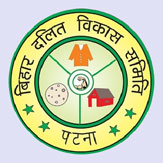Untouchability is a form of social institution that legitimises and enforces practices that are discriminatory, humiliating, exclusionary and exploitative against people belonging to certain social groups. Although comparable forms of discrimination are found all over the world, untouchability involving the caste system is largely unique to South Asia.

Night soil is a historically used euphemism for human excreta collected from cesspools, privies, pail closets, pit latrines, privy middens, septic tanks, etc. This material was removed from the immediate area, usually at night, by workers employed in this trade. Sometimes it could be transported out of towns and sold on as a fertilizer.

Dalit, also previously known as untouchable, is the lowest stratum of the castes in the Indian subcontinent. Dalits were excluded from the four-fold varna system of Hinduism and were seen as forming a fifth varna, also known by the name of Panchama. Dalits predominantly follow Hinduism, with significant populations of the adherents of Buddhism, Sikhism, Christianity, and Islam. Scheduled Castes is the official term for Dalits, who get reservation under Positive discrimination, as per the constitution of India.

A bucket toilet is a basic form of a dry toilet whereby a bucket (pail) is used to collect excreta. Usually, feces and urine are collected together in the same bucket, leading to odor issues. The bucket may be situated inside a dwelling, or in a nearby small structure.
Manual scavenging is a term used mainly in India for "manually cleaning, carrying, disposing of, or otherwise handling, human excreta in an insanitary latrine or in an open drain or sewer or in a septic tank or a pit". Manual scavengers usually use hand tools such as buckets, brooms and shovels. The workers have to move the excreta, using brooms and tin plates, into baskets, which they carry to disposal locations sometimes several kilometers away. The practice of employing human labour for cleaning of sewers and septic tanks is also prevalent in Bangladesh and Pakistan. These sanitation workers, called "manual scavengers", rarely have any personal protective equipment. The work is regarded as a dehumanizing practice.
Chuhra, also known as Bhanghi and Balmiki, is a Dalit caste in India and Pakistan. Populated regions include the Punjab region of India and Pakistan, as well as Uttar Pradesh in India, among other parts of the Indian subcontinent such as southern India. Their traditional occupation is sweeping, a "polluting" occupation that caused them to be considered untouchables in the caste system.

A waste picker is a person who salvages reusable or recyclable materials thrown away by others to sell or for personal consumption. There are millions of waste pickers worldwide, predominantly in developing countries, but increasingly in post-industrial countries as well.

Bindeshwar Pathak was an Indian sociologist and social entrepreneur. He was the founder of Sulabh International, an India-based social service organisation promoting human rights, environmental sanitation, non-conventional sources of energy, waste management and social reforms through education. He was the Brand Ambassador for Swachh Rail Mission of Indian Railways, a complement to the broader Swachh Bharat Mission. His work is considered pioneering in social reform, especially in the field of sanitation and hygiene. He received various national and international awards for his work with this organisation. He was presented with the Lal Bahadur Shastri National Award for Excellence in Public Administration, Academics and Management for the year 2017. He was conferred the Padma Bhushan, India's third-highest civilian award, in 1991.

A sanitation worker is a person responsible for cleaning, maintaining, operating, or emptying the equipment or technology at any step of the sanitation chain. This is the definition used in the narrower sense within the WASH sector. More broadly speaking, sanitation workers may also be involved in cleaning streets, parks, public spaces, sewers, stormwater drains, and public toilets. Another definition is: "The moment an individual’s waste is outsourced to another, it becomes sanitation work." Some organizations use the term specifically for municipal solid waste collectors, whereas others exclude the workers involved in management of solid waste sector from its definition.

Bezwada Wilson is an Indian activist and one of the founders and National Convenor of the Safai Karmachari Andolan (SKA), an Indian human rights organization that has been campaigning for the eradication of manual scavenging, the construction, operation and employment of manual scavengers which has been illegal in India since 1993. His work at SKA, a community-driven movement, has been recognized by the Ashoka Foundation which has nominated him a Senior Fellow. On 27 July 2016, he was honoured with the Ramon Magsaysay Award. He is an Ambedkarite.

All India Institute of Hygiene and Public Health (AIIH&PH) is a pioneering Indian institute for research and training in public health and allied sciences in Kolkata. It was established on 30 December 1932 with assistance from the Rockefeller Foundation. It functions under Director General of Health Services, New Delhi, Ministry of Health & Family Welfare, Government of India and is now affiliated with West Bengal University of Health Sciences, established in 2003.It also has a rural training centre in Singur and urban training centre in Chetla.
Pradhan Mantri Adarsh Gram Yojana (PMAGY) is a rural development programme launched by the central government in India in the financial year 2009–10 for the development of villages having a higher ratio of people belonging to the scheduled castes through convergence of central and state schemes and allocating financial funding on a per village basis.

Achieving Universal Health Care has been a key goal of the Indian Government since the Constitution was drafted. The Government has since launched several programs and policies to realize ‘Health for All’ in the nation. These measures are in line with the sustainable development goals set by the United Nations. Health disparities generated through the Hindu caste system have been a major roadblock in realizing these goals. The Dalit (untouchables) community occupies the lowest stratum of the Hindu caste system. Historically, they have performed menial jobs like- manual scavenging, skinning animal hide, and sanitation. The Indian constitution officially recognizes the Dalit community as ‘Scheduled Castes’ and bans caste-based discrimination of any form. However, caste and its far-reaching effects are still prominent in several domains including healthcare. Dalits and Adivasis have the lowest healthcare utilization and outcome percentage. Their living conditions and occupations put them at high risk for disease exposure. This, clubbed with discrimination from healthcare workers and lack of awareness makes them the most disadvantaged groups in society.

Ashif Shaikh is a social activist from India who has worked for ending sexual violence against women and children, eradication of manual scavenging, forced labour practices and human trafficking in India. He is the founder of Rashtriya Garima Abhiyan and the non profit organisation, Jan Sahas.
Harijan Sevak Sangh is a non-profit organisation founded by Mahatma Gandhi in 1932 to eradicate untouchability in India, working for Harijan or Dalit people and upliftment of Depressed Class of India. It is headquartered at Kingsway Camp in Delhi, with branches in 26 states across India.

Swachh Bharat Mission (SBM), Swachh Bharat Abhiyan, or Clean India Mission is a country-wide campaign initiated by the Government of India in 2014 to eliminate open defecation and improve solid waste management. The program also aims to increase awareness of menstrual health management. It is a restructured version of the Nirmal Bharat Abhiyan launched in 2009 that failed to achieve its intended targets.

The Sulabh International Museum of Toilets in Delhi is run by the Sulabh International, dedicated to the global history of sanitation and toilets. According to Time magazine, the museum is one of the weirdest museums among the "10 museums around the world that are anything but mundane". It was established in 1992 by Dr. Bindeshwar Pathak, a social activist, founder of Sulabh Sanitation and Social Reform Movement, recipient of national and international awards including the Stockholm Water Prize in 2009. His objective in establishing this museum was to highlight the need to address the problems of the sanitation sector in the country, considering the efforts made in various parts of the world in this field since the third millennium BC.
Vitthal Laxman Phadke, better known as Mamasaheb Phadke, was an Indian social worker, writer and Gandhian, known for his sanitation services to the rural areas in British India. He was one among the leaders of the Sanitation Brigade, comprising 1200 volunteers, set up by the 1938 Haripura session of the Indian National Congress. The Government of India awarded him its third-highest civilian honour, the Padma Bhushan, in 1969, for his contributions to society.

Bihar Dalit Development Organization was founded in Bihar, India, by José Kananaikil in 1982 for village level mobilization of Dalit men and women, solidarity building, the educational and economic empowerment of Dalits, and the elimination of caste discrimination.
Usha Chaumar is a social worker from Alwar, Rajasthan, India. She is the President of Sulabh International Social Service Organisation, the non-profit arm of Sulabh International. In 2020, she received the Padma Shri honour from the Government of India for her contribution in the field of social work, particularly in raising awareness against manual scavenging.
















